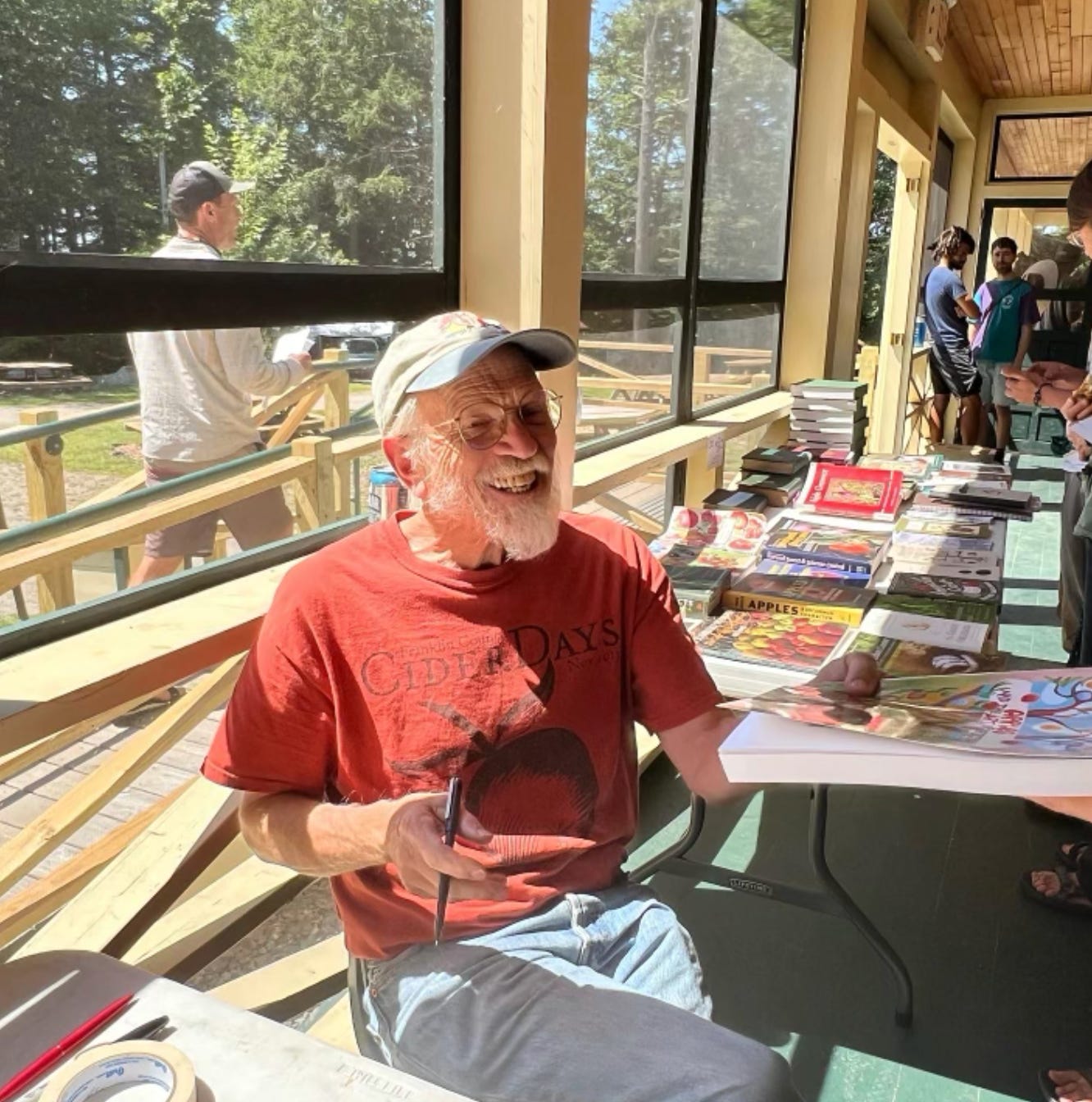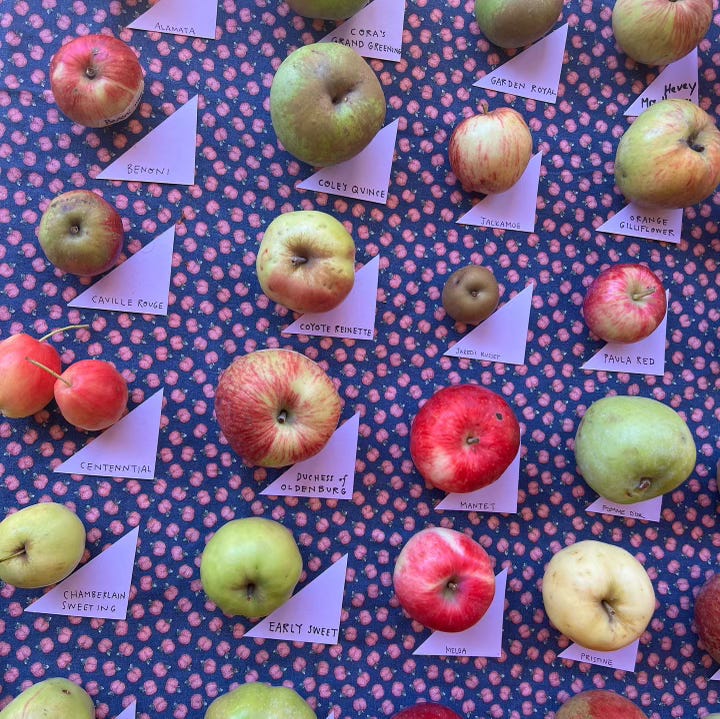The Fizz #80: Maine's Apple Camp is where the fruit lovers are
Two years ago, I went to Maine's biennual Apple Camp, a community event for the fruit-obsessed. This year, I wouldn't miss it for the world.
Hi, friends. I’m excited to bring you something a little different this week. Two years ago, I went to Apple Camp and sought to write about it for a local magazine, but the piece never came out. I’m going to publish a condensed version here. It’s a recap of the event I went to, which is being put on again this year by MOFGA and organizers like Sean Turley, who you’ve met in previous issues. This event was a wonderful experience full of community building, sharing of fruit and cider, talks and panels, and good old fashioned camp fun. I hope you can join me this year, from August 30 - September 1st. Tickets are on sale here, and it will sell out.
On the third weekend in August, the third biennial Apple Camp started with a swarm of bees. It’s as if they knew the days would be full of ripe, sweet fruit, calling all their kin to breakfast. To get to camp, attendees drove up to Pilgrim Lodge in Gardner, Maine, down the winding unpaved road and over to the registration and their shared bunks overlooking the water.
Apple aficionados made the pilgrimage from all areas of the United States, many with their own bushels of apples to cut and share, for a weekend of lectures, panels, tastings, and revelry among those similarly minded. They came because they wanted to feel they were not alone, that there are others like them, tending to orchards, skinning knees climbing trees for foraged fruit on the side of the road, working on DNA-based fruit identification.
There were definitely others—over one hundred apple lovers made it to camp, enough for MOFGA to sell out and close registration two weeks before the event. “We really have a range of different folks who come to camp. There are growers, orchardists, foragers, cider makers, preservationists, historians, people curious about apples and tree fruit,” says Laura Sieger, MOFGA’s Orchard Coordinator, who helps run the event.
Sean Turley, Maine organizer and professional apple forager, is seeing community being fostered through the conversations attendees have at Apple Camp. “For orchardists, there are debates around organic management of their orchards, cider makers talking about their ferments”, they say. “There are people buying commercial fruit from orchardists in the state or different areas in the country, and then you’ve got the historians, whose sole work is locating lost or rare varieties in hopes of getting to the last remaining tree before it dies, like a treasure hunt. There’s really an eclectic bunch here.”
For many Apple Camp attendees, apples are more than an interesting tree fruit—they’re akin to an obsession. These are environmentalists of all kinds, yearning for a deeper connection with the natural world through fruit. The heavily attended lectures and panels showed their dedication—all talks were packed, whether they were teaching foraging best practices (always have a refractometer in your car), holistic fruit growing, or apple art titled “Apples As Object”, every seat in the lodge was taken, with many opting to sit cross-legged on the floor, scribbling into notebooks every new idea.

This was Zack Kaiser’s first Apple Camp. Zack, cider maker at Absolem Cider in Winthrop, is focused on local cider apples and building a community of orchardists who grow them. “I try to source as much fruit as I can from Maine and New Hampshire,” he told me as we sat on picnic benches while campers splashed in the lake nearby. “I’m willing to offer to go up more in price or pay ahead of time as an insurance policy, if that helps out a grower. If they have fruit that they can’t sell off because it’s cracked, I’ll buy that fruit from them. Spending more money with these orchardists, you gain their trust, and it allows you to have a conversation about the future of their orchards. A lot of people get passion for nature through cider—it’s a great way to get the word out about being better stewards of the land”.
Getting together with other Maine orchardists lets him make connections that influence his final ciders. “I made a connection with someone today who is in my town and has apple trees”, he says. “They need help with pruning. These types of connections help me make new products, and make my cider hyper-local.”
For Alyssa Gavlik, her first Apple Camp was all about learning and connecting to folks who share her passion for foraging. “You can find an apple on the side of the road that’s as good as anything you’d get on the shelf at a store,” she says. “Finding a great apple in the woods—the excitement of that is what got me through the pandemic. Winter can be a really hard season, and apples are a way for me to connect with the seasons. When you observe the tree you found year after year, it’s really special.”
Last year, Gavlik foraged an apple which was labeled “Best Pocket Apple” out of a tasting of New England seedling varieties run by celebrated orchardist Matt Kaminsky, also known as Gnarly Pippins. It was photographed by local fruit photographer William Mullen, also known as Pomme William, and logged in a pomology book coming out next year. [Check out Gnarly Pippins pomology books here]
John Bunker is an Apple Camp organizer and speaker every attendee builds their schedule around. Every morning, Bunker wakes up before dawn. He grinds four to five apples from his orchard in a hand-crank apple grinder for applesauce, then uses a small metal hand mill to remove the seeds. From there, his day of orchard-tending, public speaking, consulting, or building starts.

Bunker is a New England living legend, our very own Maine Johnny Appleseed, sometimes affectionately referred to as the “Apple Whisperer”. He is the founder of FedCo Trees and the Maine Heritage Orchard in Unity, as well as board member of MOFGA and consultant to countless organizations and individuals in agriculture. He has dedicated his life to discovering, identifying, and spreading knowledge about Maine’s heirloom apples, growing over one hundred different apple trees on his homestead, many with several grafted varieties per tree.
Today, Bunker’s time is spent organizing events like Apple Camp, Great Maine Apple Day, Common Ground Country Fair, and others, public speaking, and investing time into teaching the next generation how to care for orchards and identify seedling fruit. At Apple Camp, he runs sessions like “Holistic Pest Management” and “Apple Preservation”.
On the last night of camp, during the cider sharing event, makers opened their own bottles, brought with them on the drive or flight to share with the group. We sat under the stars and let loose, talking about the season, the apples, and the hopes of the years ahead.
You can buy tickets for this year’s Apple Camp on the MOFGA website. I hope to see you there this year!





apple camp!!
Loved the piece! Great to relive that gorgeous weekend through your words.